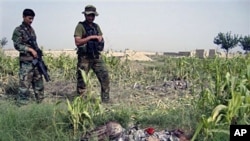Seven CIA operatives were killed in the attack. Intelligence officers took some fatal shortcuts in their bid to get at key terrorist targets.
Jordanian doctor Humam Khalil Abu-Mulal al-Balawi had presented himself as someone who could lead the CIA to one of its top targets, al-Qaida deputy chief Ayman al-Zawahiri. When brought to the CIA base in Khost last Dec. 30 by Jordanian intelligence officers to meet CIA officials, he detonated a suicide bomb. Five CIA officers, two contractors, a Jordanian officer, and an Afghan driver were killed in the attack.
The investigation by the CIA's counterintelligence division ruled that CIA officers' enthusiasm overruled caution. It found that they had not sufficiently investigated - or vetted, to use intelligence jargon - al-Balawi. And a warning about al-Balawi's trustworthiness from one Jordanian officer was ignored.
CIA director Leon Panetta ordered a separate independent review of the task force's findings by former U.S. diplomat Thomas Pickering and former Department of Homeland Security intelligence chief Charles E. Allen. Allen says he and Ambassador Pickering concurred with the CIA task force findings.
"There were some counterintelligence flags [warning signs] probably from the outset that we did not, from a counterintelligence and security point of view, follow up either at headquarters or in the field," said Allen. "I'm not going to discuss the Jordanian aspects of this because whatever failures there were, as Director Panetta has said, were collective failures at both headquarters and in the field, as series of decisions that were made over a period of months."
Some former officials say the Khost event underscores the gulf between counterterrorism and counterintelligence. Counterterrorism operatives are trained to attack, to go after terrorist targets, and are thus aggressive and offensive. Counterintelligence officers are schooled in protection, and are more cautious and defensive.
Former CIA director Michael Hayden, who was personally briefed on the findings by his successor, notes the CIA fix recommended in the report is to get counterintelligence officers to work more closely with counterterrorism operatives.
"The structural fix is to literally, I mean physically, embed more counterintelligence referents, as we call them, more counterintelligence specialists, inside the counterterrorism center, so as these guys are going out, being aggressive, trying to get to the enemy, you always have someone there saying, okay, slow down, let's check this out, let's review this one more time, why do we believe this, why do we have confidence here - kind of a permanent gadfly or ombudsman for safety even as these guys go all out to try to kill or capture enemies," said Hayden.
But other former intelligence officers disagree with the findings. Charles Faddis, a former CIA operations officer with long experience in the Near East and South Asia, says the mistakes that were made could have been averted had the officers involved followed basic security procedures.
"I've run, I've executed a host of meetings like this. I've supervised and led guys who have executed hundreds more, as have plenty of other operations officers in the CIA," Faddis said. "And the way this operation was conducted was not the way you function. This is cutting corners and blowing past very basic procedures that have been in place for a long, long time."
Faddis says the basic mistake was to trust al-Balawi in the first place, especially after warnings were raised. There is no such thing as a trusted double agent, he says.
"Those concepts don't exist in intelligence work, particularly in a war zone. There is no such thing as a guy you put in contact with a terrorist organization and then you trust him. That's not the way intelligence works. You don't trust anybody, and you take security measures all of the time," Faddis said.
Former officials also cite a lack of seasoned intelligence officers as an additional problem area. A great many CIA officers retired after the end of the Cold War, and the majority of the currently serving CIA officers were hired only after Sep. 11, 2001. As a result, officials say, many operatives with no field experience are sent to Afghanistan straight out of training.
